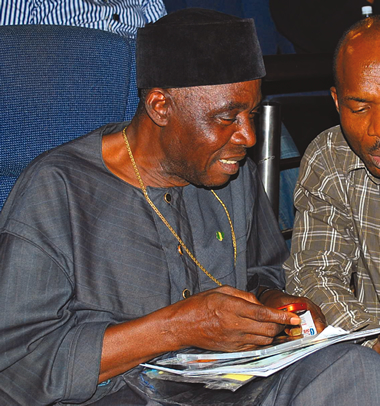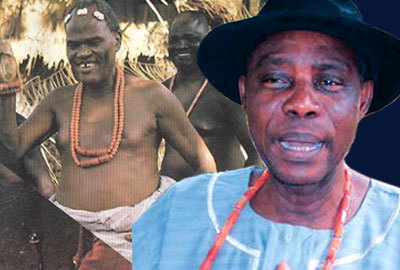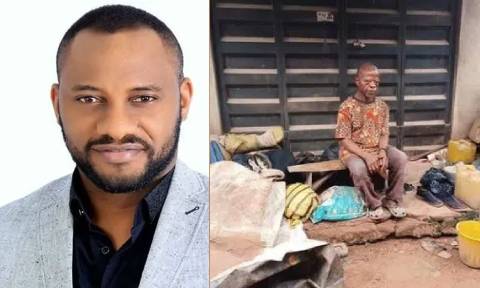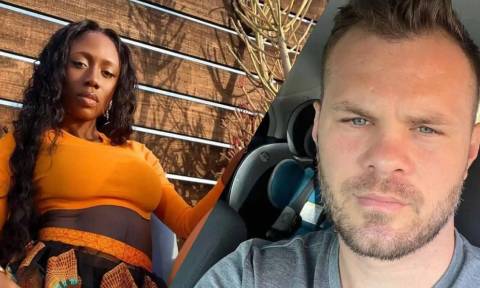
Chief Eddie Ugbomah, a pioneer filmmaker in Nigeria, lives in Lagos. He recently clocked 70 years, but he tells ADEOLA BALOGUN why he decided to postpone the celebration
Why did you choose this remote part of the city as your home?
It is an exclusive place to be. Over 40 films have been shot in this place and if not for the elections, you would have met some people shooting a film here. So, this is a place where I set up what I call the first African film village since 1979. I bought the thick forest, over five acres of land. By then, nobody could pay N100 per plot but I paid N500 and I set it up for people to shoot films. If you watch most of the films, even Feyikogbon stayed here for one year shooting his TV series. Oga Bello, Jide Kosoko, Chico Ejiro, Zeb Ejiro, name it, all the major filmmakers, this was their former film village before the Igbo brought their tribalism and took it to Enugu. The Yoruba took their own to Ikorodu and Osogbo. But now, the governor of Lagos State has agreed to help us build a film village here in Badagry when I spoke to him since he said he would not give us money. Don’t forget too that President Goodluck Jonathan has provided $200m for entertainment development; right now we’re negotiating. I moved here to create a Nigerian/African film village, where we have a natural environment far away from the chaotic atmosphere of Lagos. Creative people have their own eccentric way of thinking; you know that I can’t create a film village in Ikoyi. Apart from the fact that I can’t afford it, the atmosphere there is not conducive. Here, we’re next door to Peter King Music College, where the likes of Asa, Omowunmi and other stars were made. I’ve been able to create so many stars here; somebody like Liz Benson was brought up here, Mercy Johnson was brought up here, name it. So many stars have been trained in this house. The exclusivity of this area is a factor. The only headache I have here is electricity and okada (commercial motorcycles), but we can’t control both.
You have always been a strong critic of the Nigerian home video industry. In fact, at a point you said there was nothing like Nollywood. Do you like being referred to as a born critic?
No, it is a mistake Nigerians make; we’re hypocrites. We hate to be criticised or told the truth. I’m one of the icons and pioneers of the film industry and because of the bad economy when the military messed up Nigeria, when the economy nosedived, then celluloid died. And the boys came up with this craze to shoot anything and any nincompoop can jump up and say I’m a filmmaker. One day, one stupid Indian woman came and said, ‘Oh, you are like Hollywood and Bollywood, why don’t you say Nollywood?’ and the boys jumped up and said they are Nollywood. Nolly means nothing in the dictionary, so we have Nothingwood. But for peace, I started to tolerate it and if you don’t know, I’m the chairman of the board of trustees for the producers and directors. Nowhere in the world where you have video festivals, don’t let anybody fool you. So, why are we fooling ourselves to say we’re the third makers of junk videos in the world? Film is still film, whatever the technical knowhow that is coming up now. The only way is that when you shoot film on celluloid, you can download it for home video for those who can’t go to the cinema; they are the reason why there is video. In Europe, they hire videos from video clubs, unlike in Nigeria where you acquire it and dub in your house. The filmmaker first of all starts making money from celluloid film; they start making money from the video before going to television stations. The path of a good movie is from the cinema, to home video and then television stations. I wasn’t criticising them for shooting videos; I criticised them for refusing to grow up. I don’t just criticise; I’ve been all over the world. I grew up in Britain, I schooled in America and I tour Europe a lot and I wish Nigeria is far better because we have more opportunities.
If the likes of Ogunde, you, Ade Love could shoot on celluloid, by now, the industry should have grown beyond the popular home video. Why have we not grown?
Mainly, the most important thing is training. How many of them know what celluloid is? How many of them know how to shoot celluloid without a monitor? How many of them know the right footage at sequences? They don’t know this but they hide under the phrase, ‘Time has changed;’ we’re hypocrites; we always like to cover up our stupidity with excuses. Then, there is this hatred for people like me for having such an intimidating qualification and instead of being humble enough to tap, they run me down. As Obasanjo will say, I dey kampe. Whether it is home video, I dey kampe; whether it is celluloid, I dey kampe. Like the $200m put down by Jonathan, everybody is going to apply to shoot a video film; I have applied to shoot a celluloid film on either the Niger Delta or Aba Women Riots. I shoot authentic contemporary epics. You can watch the line of my films, The Mask, The Death of the Black President, Oyenusi, Apalara, Oil Doom. I forecast the doom in 1978; where are we today? So, these are the kinds of films I shoot to educate and propagate and entertain my nation, to let the white man know that we can do better if given a chance. But unfortunately, Nigerians don’t like decent things. I’m like Jesus Christ shouting alone in the desert. I’m only asking for $1.5m and I will shoot an epic that can win any award, a Nigerian story, shot in Nigeria by Nigerians and taken to anywhere in the world. We have been going to the Cannes Film Festival for the past 12 years with nothing to show. The Nigerian Film Corporation used to hire a kiosk, but nothing else. What they should have done like South Africa is to shoot locations with nice sceneries depicting our tourism potential and sell to foreign filmmakers, thus inviting them over to come and shoot their films. Kenya doesn’t have anything but they could advertise their animals and their forests and people troop to Kenya. We have over 16 waterfalls in Nigeria; if you want to do tourism, you have to correct Nigeria first. You are coming for tourism in Nigeria, you land at the airport and it takes five hours to clear your luggage; you take a taxi and it takes you five hours to go through the traffic without air condition to your hotel and as you are checking in, PHCN strikes. Would you want to come back to such a country again? The same thing is happening in the movie industry: we don’t have those who know movies. We only have boys who want an easy way out; they shoot in the morning and in the evening, they are out.
Apart from training which you have mentioned, are you saying that the practitioners don’t need people like you to guide them?
It is because our people hate to learn; we don’t learn from past mistakes and that is why we keep on repeating the same thing. The bottom line is money: there are no people financing the industry and it is a mega industry. I praise those marketers who put down their money or else there wouldn’t have been nothing called the movie industry today. I’m only angry at the boys for refusing to learn and grow up; they want to shoot on Monday and release on Friday and make their money and use it for something else. If those who have made millions from the industry have put some of it back, and open a place where people can be trained, we would have gone far. When they find out that they can’t continue shooting films, they go into heavy piracy by going abroad to perfect their act. What the government too does not realise is that the entertainment industry is a very vital segment of the economy to be well catered for. I was in America when there was going to be a riot of 35 million blacks; so the government was worried because a 35 million-man riot is no joke. They told all the major network stations in America to play James Brown and when they were playing James Brown music, every black sat down at home to watch. They were all happy, they were all drunk. That was how they forgot the strike. That is the power of entertainment. Movies sooth people’s anger and stress, especially having passed through hectic traffic. You saw how (Dora) Akunyili failed in her rebranding project: she came begging me and Nollywood that she needed us to rebrand Nigeria; the next thing she said was that Nollywood was the worst thing to happen to Nigeria. That is why she failed. Look at Americans, they came here and stole bata music and called it break dancing. James Brown too came and adopted Owerri music of double drums and he became a world star. We have so many epic stories that the world wants to watch.
If you could take to filmmaking training by the time you did, I think by now, more Nigerians should have opted for the career.
Let me give you the joke: almost 50 universities have departments of theatre arts; do they have equipment to train their students? Some of these guys come out with honours, but they have nothing to show. But in America, Britain or Germany, when you go to the university to learn cinematography, your first year, you learn all aspects of it, at the end of your study, you must pick just an area: either you want to be editor or director or a producer or an effect person, but here in Nigeria, things don’t happen that way. How many stars have come out of the universities? The only ones are those who came out of the Jos Film Institute, which I set up when I was the chairman of the Film Corporation. But we need a film village, which (Raji) Fashola has assured me he would help us build. My daughter read theatre arts in LASU, but she can’t run the school I built for her. In Nigeria, I do a lot of part time lecturing but do they want to pay? When I go to America, I lecture and I get paid. I was a lecturer in LASU for four years when they set up the Department of Film, now Theatre Arts and Music, while the young lecturers were taking N60,000 monthly, they wanted to pay me N20,000 a year, saying it is just honorarium. When I went to UNIBEN to teach, the same thing and that is why I don’t take much interest but when I go to America, especially New York and Washington DC, I lecture there for $200 a day. So, when I do three days for each university, I get $600 and I have eight universities I do that for. So, I do my shopping and I come home. Look at the film, Spiderman, they build special cameras for each film and after shooting it, the camera is useless. The man who does all the acrobatics in Spiderman is Japanese, though the film is American. As he was doing the acrobatics, he is carrying a camera recording everything he does because no cameraman can follow him and get everything. But we refuse to learn here. Look at the insult when they say they create a new segment for Nigerian videos in Ouagadougou. When you get there, they take you to the Ajegunle aspect of the place, while all the French films will come first, second and third. We have the Zuma Festival in Nigeria, it is a failure; we have Bob TV, it is a monumental failure; they have the Abuja Film Festival, it is worthless, look at Lagos Film Festival, it is a failure. I’ve been talking to them but they say my time has gone. Charlie Chaplin died at 98 on set, why do they want to kill me at 70 because they don’t want to learn? The movie industry is a great employer of labour, but we don’t realise it. That is why you see a lot of artistes dancing for Jonathan because for the first time, a president has come to talk to us. (Olusegun) Obasanjo didn’t do it, yet he loved music and comedy. The time he wanted to do it was the time he was about to leave. When he went to London, he was asked whether he brought Nigerian films. He was surprised and when he came back, he called (Frank) Nweke Jnr. to tell him. Babangida built a film lab in Jos but people killed the lab because they were using it to steal money.
But you had encounters with Obasanjo…
Yes. When he asked me whether I was happy with my OON, I told him that it was 20 years late but better late than never because they gave me MON during the time of Shagari, I refused to take it. Shagari gave me MON and removed EY, money which is what I want. But when Obasanjo came and gave me OON, I said that is high enough and I took it. Look at the wall: I have 13 children, nine are graduates, two are in the university. God has been so good to me, the industry has been good to me but I want to leave something behind. That is why I’m fighting these boys to get big, not to get cheap by shooting a film on Monday and be in the market on Friday. There is nowhere you mention The Death of a Black President today that people will not remember the film, but you can mention over 200 home videos and people don’t know. Many years ago, the NTA told film makers that it was going international, and so they should stop selling films to African Magic. It said instead of buying at $1,000 by African Magic, NTA would buy for $2,000. Are they buying; are they paying? I did a documentary on the history of Nigeria film at 50, only AIT bought it and NTA got N500m from the government to write their history. They say our films are famous abroad; it is a lie. In Europe, it is those Nigerians that miss home that watch them, not the white men. I’ve not seen a white man in America or Britain go to buy a Nigerian film. It is when Nigerians are watching it that the white friends say, ‘Oh you make films in Nigeria?’ I remember when I was watching one of my films in London, they couldn’t believe we have skyscrapers in Africa; they were telling me, ‘Where did you shoot this Eddie?’ I said, ‘New York;’ they said, ‘No wonder.’ I then told them, those black people you see on the streets, are they Americans? I said that is Lagos, they couldn’t believe it because they were brought up to believe we live in jungles.
Don’t you think that government should support the industry because of its potential?
That is the problem in this country; we always have square pegs in round holes. Who are these ministers of arts and culture? They are just some people from their political parties; they are not close to those people in the business. I know the agony I went through as the adviser and consultant to the Nigerian Film and Video Censors Board when I started educating them during the days of Mrs. Odeh; things changed. People stopped doing bloody films, but when Emeka Mbah came, since 2008, they have not paid my salary till today because they found out I was telling them the truth. He came in with four of his assistants who were dumped on him by his godfathers, they just pushed me out. And look at what is happening here now. Because of the $200m Jonathan money, the Performing Musicians Association of Nigeria has about Actors Guild going to court every day. See the Association of Nigerian Theatre Practitioners, they have about 15 segments, for what? That is why they have not achieved anything. If all of us come together irrespective of tribe and language, we write a proposal for a big budget film, we would be respected in applying for the $200m.
At 70, how would you describe your life as a filmmaker?
This is an unappreciative country. As Eddie Ugbomah, I’m very proud of myself. I’ve 13 children and nine are graduates; I’ve this massive compound here; I’ve a house in my village and a house in Washington DC. What else do I want God to do for me? I’ve trained so many artistes; if I die now, I will be smiling like Zik. I’m only regretting that the younger ones are not tapping anything from me, not trying to see me as old school. Now I’m living on goodwill; I have no income. The other time, my car broke down and I took an okada to the office; yet I’m OON. None of my children wants to be involved in the industry because they know the agony I have passed through. I’ve lost a lot because of lack of proper storage for my films. Celluloid should be kept in a cool place. I’m now trying to salvage some of them by taking them to America to turn into DVD. Apart from this, I’m a very happy man. The only sad aspect is that I lost my wife about 10 years ago, but I am happy with my children.
Why did you even take to filmmaking?
I found out very young the power of cinema. I was a small boy and climbed the wall of Glover Memorial Hall in 1959 to watch Zik bring Charlton Heston to Nigeria with a film called Ben Hur. The man was kind of reprimanding Nigeria that a big country like ours didn’t have a film industry and I shouted on top of my voice that, ‘Oyinbo, you will never come to Nigeria again because I’m going to be a filmmaker.’ That is how the thing sank in. I was very brilliant in school and everybody thought I was going to be a doctor or engineer but I chose film.
When you clocked 70 last December, why did you postpone the birthday bash?
We couldn’t raise enough of the fund we needed because people don’t appreciate men. That is why I decided to take it upon myself to celebrate myself. I’m shooting a film called Desert Warriors, how the Fulani invaded Nigeria. I’m also publishing a book called Pains of Eddie Ugbomah at 70 with lots of stories on all my films. Then I’m going to do a concert to launch my foundation, Eddy Efosa Food Foundation with a lot of old and new artistes. We’re looking at May or June to do all this and then, I would have celebrated my birthday properly.
Why didn’t you consider getting married again after you lost your wife about 10 years ago?
I’ve had bad luck with women. My first wife was harassed by my family: they said she couldn’t cook Nigerian food and she said we should go back to America or England and I said never, so she left. The second one, I was away in America, she got pregnant for the deacon of their church. Then the last one I married, she was about 40, she died suddenly. So, for the past 10 years, I’ve been a bachelor and I’m not looking for ever to make a mistake of a woman again. I’m happy with my children.



















